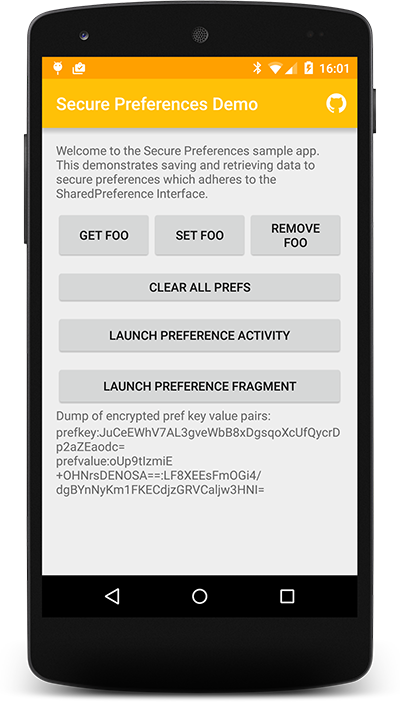- Please use EncryptedSharedPreferences from androidx.security in preferenced to secure-preference. (There are no active maintainers Secure-preferences)
This is Android Shared preference wrapper that encrypts the values of Shared Preferences using AES 128, CBC, and PKCS5 padding with integrity checking in the form of a SHA 256 hash. Each key is stored as a one way SHA 256 hash. Both keys and values are base64 encoded before storing into prefs xml file. By default the generated key is stored in the backing preferences file and so can be read and extracted by root user. Recommend use the user password generated option as added in v0.1.0.
The sample app is available on playstore
The v0.1.0 release was a major refactor of the guts of secure prefs, which is Not backwards compatible yet with older 0.0.1 - 0.0.4 versions. So if you have an existing app using this don't upgrade. I'll be looking to add migration into a later release.
Maven central is the preferred way:
Note: v0.1.0 was dependent on snapshot of aes-crypto, this is only as I was waiting for the aes-crypto repo owner to upload to maven. I've sorted this for v0.1.1+ which is no longer dependent on Snapshot repo.
dependencies {
implementation 'com.scottyab:secure-preferences-lib:0.1.7'
}Or download the release .aar or clone this repo and add the library as a Android library project/module.
As of v0.1.4 no specific -keep config is needed.
There is specific DexGuard config supplied with DexGuard 7+ located <dexgaurd root>/samples/advanced/SecurePreferences
This will use the default shared pref file
SharedPreferences prefs = new SecurePreferences(context); You can define a separate file for encrypted preferences.
SharedPreferences prefs = new SecurePreferences(context, null, "my_custom_prefs.xml");Using a password that the user types in that isn't stored elsewhere in the app passed to the SecurePreferences constructor means the key is generated at runtime and not stored in the backing pref file.
SharedPreferences prefs = new SecurePreferences(context, "userpassword", "my_user_prefs.xml");SecurePreferences securePrefs = new SecurePreferences(context, "userpassword", "my_user_prefs.xml");
securePrefs.handlePasswordChange("newPassword", context);SharedPreferences keys and values are stored as simple map in an XML file. You could also use a rooted device and an app like cheatdroid
<map>
<int name="timeout" value="500" />
<boolean name="is_logged_in" value="true" />
</map><map>
<string name="TuwbBU0IrAyL9znGBJ87uEi7pW0FwYwX8SZiiKnD2VZ7">
pD2UhS2K2MNjWm8KzpFrag==:MWm7NgaEhvaxAvA9wASUl0HUHCVBWkn3c2T1WoSAE/g=rroijgeWEGRDFSS/hg
</string>
<string name="8lqCQqn73Uo84Rj">k73tlfVNYsPshll19ztma7U">
pD2UhS2K2MNjWm8KzpFrag==:MWm7NgaEhvaxAvA9wASUl0HUHCVBWkn3c2T1WoSAE/g=:jWm8KzUl0HUHCVBWkn3c2T1WoSAE/g=
</string>
</map>By default it's not bullet proof security (in fact it's more like obfuscation of the preferences) but it's a quick win for incrementally making your android app more secure. For instance it'll stop users on rooted devices easily modifying your app's shared prefs. Recommend using the user password based prefs as introduced in v0.1.0.
Please do send me pull requests, but also bugs, issues and enhancement requests are welcome please add an issue.
Much of the original code is from Daniel Abraham article on codeproject. This project was created and shared on Github with his permission.
Apache License, Version 2.0
Copyright (C) 2013, Daniel Abraham, Scott Alexander-Bown
Licensed under the Apache License, Version 2.0 (the "License");
you may not use this file except in compliance with the License.
You may obtain a copy of the License at
http://www.apache.org/licenses/LICENSE-2.0
Unless required by applicable law or agreed to in writing, software
distributed under the License is distributed on an "AS IS" BASIS,
WITHOUT WARRANTIES OR CONDITIONS OF ANY KIND, either express or implied.
See the License for the specific language governing permissions and
limitations under the License.
The sample app Lock icon for sample app licenced under Creative Commons created by Sam Smith via thenounproject.com

